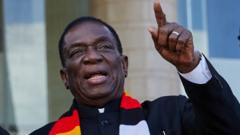In a significant move that reflects the increasing unrest within Zimbabwe, President Emmerson Mnangagwa has replaced Lt Gen Anselem Sanyatwe, tasked with addressing growing calls for his resignation due to allegations of mismanagement and corruption.
President Mnangagwa Appoints New Army Chief Amidst Rising Tensions

President Mnangagwa Appoints New Army Chief Amidst Rising Tensions
Zimbabwe's President Emmerson Mnangagwa has taken decisive action by appointing a new army chief, Emmanuel Matutu, in light of mounting protests planned by war veterans seeking his resignation.
The appointment of former major general Matutu comes ahead of anticipated protests scheduled for Monday, organized by war veterans dissatisfied with Mnangagwa’s leadership. Since ascending to the presidency in 2017 after a coup that ousted longtime ruler Robert Mugabe, Mnangagwa has maintained a contentious reputation which is evident in the nickname "The Crocodile."
This leadership change comes after Mnangagwa's earlier assurances that he would step down in three years have not assuaged doubts among former allies, who fear he may be attempting to maintain his grip on power beyond his current term, which ends in 2028.
This situation has sparked fears reminiscent of the coup that toppled Mugabe, with party rallies last year showcasing growing discontent among Zanu-PF members regarding the president's intentions.
As tensions rise, the security minister cautioned against participation in the planned demonstrations, while law enforcement has instituted a four-day prohibition on carrying weapons or items capable of causing harm in the capital. The extent of public support for the veterans’ protests remains unclear.
With political and civil unrest looming, this crucial appointment and the government’s responses illustrate the volatile landscape Zimbabwean citizens face as they navigate challenges to their leadership.
This leadership change comes after Mnangagwa's earlier assurances that he would step down in three years have not assuaged doubts among former allies, who fear he may be attempting to maintain his grip on power beyond his current term, which ends in 2028.
This situation has sparked fears reminiscent of the coup that toppled Mugabe, with party rallies last year showcasing growing discontent among Zanu-PF members regarding the president's intentions.
As tensions rise, the security minister cautioned against participation in the planned demonstrations, while law enforcement has instituted a four-day prohibition on carrying weapons or items capable of causing harm in the capital. The extent of public support for the veterans’ protests remains unclear.
With political and civil unrest looming, this crucial appointment and the government’s responses illustrate the volatile landscape Zimbabwean citizens face as they navigate challenges to their leadership.



















